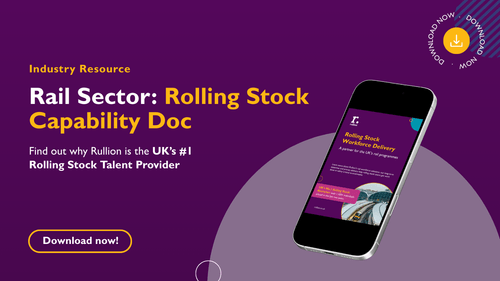Building a Career in Nuclear with Jens Christiansen
Welcome back to Rullion Reflections, our video interview series spotlighting the people driving change in the UK and European nuclear industry. In Episode 4, Sibel Akel, Marketing Director at Rullion, sits down with Jens Christiansen, a rising voice in nuclear engineering whose journey began not in a lab or lecture hall, but in a grassroots advocacy movement in Denmark.
Watch the full interview with Jens or read on for the key highlights from the conversation.
From Advocacy to Engineering
Jens’ path into nuclear didn’t follow a conventional route, largely because it couldn’t. In Denmark, nuclear power has been banned since 1985, making both academic and professional pathways into the sector difficult to access.
His passion was ignited by a local group of young advocates, Johan Christian Soled, Theis Palm, and Mads Bunch Larsen, who launched a pro-nuclear organisation in 2020 called Nuclear Power? Yes Please.
“They were just making a lot of noise about nuclear and the green transition. And as I learnt more, I just became even more interested.”
With a background in physics, Jens began tailoring his studies toward a future in nuclear. A breakthrough came when one of his university professors, a nuclear physicist, launched a course in reactor physics. That course became a gateway. Through it, Jens connected with nuclear experts in Sweden, which ultimately led to a reactor physics internship with Westinghouse Electric in Sweden.
“I was really passionate about nuclear before I even started working in the nuclear space. So, now I’m finally in a nuclear career, every day is a really interesting day because I'm just so excited.”
The Changing Nuclear Conversation in Denmark
Public opinion around nuclear energy has shifted dramatically in Denmark over the past four years, something Jens has witnessed firsthand.
“In 2020, just 16–20% of Danes supported nuclear energy. Now it’s more than 55%. It’s a drastic shift, and it’s still growing.”
He attributes this to more open conversations, evidence-based advocacy, and the growing urgency of climate change. In the last month, this shift has also seen talks of Denmark analysing the potential benefits of new nuclear technology in the future.
Mythbusting and Opening the Doors to Nuclear Energy
Despite growing public support, nuclear energy is still burdened by persistent misconceptions around safety, speed, and cost. Jens is often asked the same questions, with many still believing nuclear is dangerous or too slow to deploy.
But the facts tell a different story. Reports like the EU’s JRC study have ranked modern nuclear among the safest forms of energy and they’ve also recently launched a modelling hub for nuclear applications to provide deeper evaluation of both nuclear safety and energy policies. Whenever speed is brought into question, Jens points out that “Sweden built ten reactors in fifteen years,” proving speed is achievable with the right planning.
Beyond mythbusting, Jens sees a bigger issue: visibility. He believes the industry keeps too much behind closed doors, making it harder for the public and future talent, to understand what’s really happening.
“There’s incredible technology in this industry, and it’s amazing to see how many problems regarding safety and reactor building are actually under control, but most people never get to see it. The industry needs openness just as much as it needs advocacy.”
Knowledge Transfer
“There are some really expert people here… but they’re coming of age. Young people need to quickly get as much knowledge as they can before these legends retire.”
The nuclear sector is facing a critical generational shift. As seasoned professionals near retirement, there’s a real risk of losing decades of invaluable technical knowledge and operational insight. For organisations, this makes succession planning, structured mentoring, and cross-generational collaboration more important than ever. Capturing and passing on expertise will be increasingly central to ensure continuity across the global energy transition.
On Mentors and Mindsets
Jens credits many of the incredible people that have helped him during his nuclear career and opened doors for him along the way:
- Johan Christian Soled, Theis Palm, and Mads Bunch Larsen, founders of Nuclear Power? Yes Please.
- Hans Fynbo – Professor at Aarhus University
- Antonios Mylonakis and Zsolt Elter – Jen’s mentors and supervisors at Westinghouse
Tripling Nuclear by 2050
Jens’ ultimate goal is to become a reactor physics legend in the industry, and is also a vocal supporter of global goals to triple nuclear capacity by 2050.
“I see some of the incredible experts in the industry currently, and that’s really motivating to me. I want to keep this knowledge in the industry… and maybe even have my name on something one day.”
“We’ve built up this momentum in the past five years. The industry is getting ready. The population is getting a lot more accepting. And politicians are starting to look more seriously. I’m really excited to see where the coming years take nuclear energy.”
Ready to start your own nuclear career? View our latest nuclear jobs.
Powering the Future of Nuclear Starts With People
At Rullion, we work with pioneering organisations across the UK nuclear industry to find, attract, and support the people who are driving change. Whether you're scaling new technologies, meeting regulatory milestones, or shaping the next generation of clean energy jobs in the UK, we're here to help.
Book a discovery call with one of our consultants to see how we can help you get work done.





